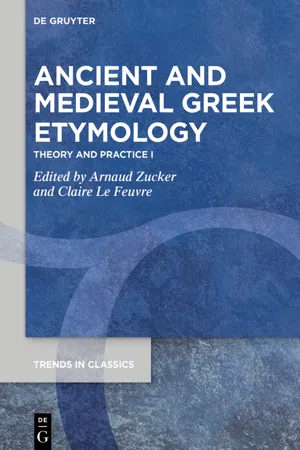
Ancient and Medieval Greek Etymology
Theory and Practice I
Arnaud Zucker, Claire Le Feuvre, Arnaud Zucker, Claire Le Feuvre
- 350 páginas
- English
- ePUB (apto para móviles)
- Disponible en iOS y Android
Ancient and Medieval Greek Etymology
Theory and Practice I
Arnaud Zucker, Claire Le Feuvre, Arnaud Zucker, Claire Le Feuvre
Información del libro
This volume on Greek synchronic etymology offers a set of papers evidencing the cultural significance of etymological commitment in ancient and medieval literature. The four sections illustrate the variety of approaches of the same object, which for Greek writers was much more than a technical way of studying language. Contributions focus on the functions of etymology as they were intended by the authors according to their own aims. (1) "Philosophical issues" addresses the theory of etymology and its explanatory power, especially in Plato and in Neoplatonism. (2) "Linguistic issues" discusses various etymologizing techniques and the status of etymology, which was criticized and openly rejected by some authors. (3) "Poetical practices of etymology" investigates the ubiquitous presence of etymological reflections in learned poetry, whatever the genre, didactic, aetiological or epic. (4) "Etymology and word-plays" addresses the vexed question of the limit between a mere pun and a real etymological explanation, which is more than once difficult to establish. The wide range of genres and authors and the interplay between theoretical reflection and applied practice shows clearly the importance of etymology in Greek thought.
Preguntas frecuentes
Información
Part I: Etymological Practices and Philosophical Issues
Naming the Art, or the Art of Naming: The Etymology of τέχνη (technē) in Plato’s Cratylus
1 Introduction
2 The etymology of τέχνη
| ΣΩ. | […] ἀλλ’ οὐ γὰρ ἐπισκοπεῖς με ὥσπερ ἐκτὸς δρόμου φερόμενον ἐπειδὰν λείου ἐπιλάβωμαι· ἐπίλοιπα δὲ ἡμῖν ἔτι συχνὰ τῶν δοκούντων σπουδαίων εἶναι. |
| ΕΡΜ. | Ἀληθῆ λέγεις. |
| ΣΩ. | Ὧν γ’ ἔστιν ἓν καὶ “τέχνην” ἰδεῖν ὅτι ποτὲ βούλεται εἶναι. |
| ΕΡΜ. | Πάνυ μὲν οὖν. |
| ΣΩ. | Οὐκοῦν τοῦτό γε ἕξιν νοῦ σημαίνει, τὸ μὲν ταῦ ἀφελόντι, ἐμβαλόντι δὲ οὖ μεταξὺ τοῦ χεῖ καὶ τοῦ νῦ καὶ <τοῦ νῦ καὶ> τοῦ ἦτα; |
| ΕΡΜ. | Καὶ μάλα γε γλίσχρως, ὦ Σώκρατες. |
| ΣΩΜ | Ὦ μακάριε, οὐκ οἶσθ’ ὅτι τὰ πρῶτα ὀνόματα τεθέντα κατακέχωσται ἤδη ὑπὸ τῶν βουλομένων τραγῳδεῖν αὐτά περιτιθέντων γράμματα καὶ ἐξαιρούντων εὐστομίας ἕνεκα καὶ πανταχῇ στρεφόντων, καὶ ὑπὸ καλλωπισμοῦ καὶ ὑπὸ χρόνου. ἐπεὶ ἐν τῷ “κατόπτρῳ” οὐ δοκεῖ [σοι] ἄτοπον εἶναι τὸ ἐμβεβλῆσθαι τὸ ῥῶ; ἀλλὰ τοιαῦτα οἶμαι ποιοῦσιν οἱ τῆς μὲν ἀληθείας οὐδὲν φροντίζοντες, τὸ δὲ στόμα πλάττοντες, ὥστ’ ἐπεμβάλλοντες πολλὰ ἐπὶ τὰ πρῶτα ὀνόματα τελευτῶντες ποιοῦσιν μηδ’ ἂν ἕνα ἀνθρώπων συνεῖναι ὅτι ποτὲ βούλεται τὸ ὄνομα· ὥσπερ καὶ τὴν Σφίγγα ἀντὶ “φικὸς” “σφίγγα” καλοῦσιν, καὶ ἄλλα πολλά (Crat. 414b2–d5).3 |
| SOCR. | […] But don’t you perceive how I am, so to speak, driven off the race-course as soon as I reach smooth ground? Yet many things, of the sort that seem serious, still remain to be examined. |
| HERM. | It is true. |
| SOCR. | One of these is to see what “craft” (τέχνη) might mean. |
| HERM. | Yes, indeed. |
| SOCR. | Now, doesn’t this signify “holding on to intelligence” (ἕξις νοῦ), once you take out the taû and insert an oû between the cheî and the nû and between the nû and the ȇta? |
| HERM. | Yes, Socrates, but with great difficulty. |
| SOCR. | My dear friend, don’t you know that, by now, the first given names have been altogether buried by those who wanted to theatricalize them by adding and removing letters for the sake of euphony and by turning them around in all sorts of ways, and also by embellishment and time? As for the “mirror” (κάτοπτρον), doesn’t it seem strange to insert a rhô? But such things, I believe, are the work of those who care nothing for the truth, but shape the mouth in such a way that, inserting many new elements into the first names, they end up preventing any human being from understanding what the name means in the first place: so, for instance, they call the Sphinx “σφίγξ” rather than “φίγξ”, and so on and so forth. |